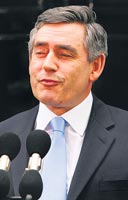
New premier keeps it down to sizeHere is something for Sri Lankans everywhere to ponder. The United Kingdom is a country of 60 million people, three times the population of Sri Lanka. It has just got itself a new cabinet. It is just 22 full ministers, about one-third the size of our own cabinet. What is even more interesting is that new Prime Minister Gordon Brown's full cabinet is one less than that of the just departed Tony Blair even though the new broom at N0 10 Downing Street has reached outside the Labour Party to bring in new blood into a government that has been in power for 10 years.
There is surely a lesson somewhere for Sri Lanka which, by the last count, had the largest cabinet in the world even more than the largest democracy on earth- India, with a population of more than one billion. That is not the only lesson to be learnt from last week's handover of power, albeit within the same party, and the restructuring of the government. When the retiring prime minister left London for his electorate in Sedgefield, there was no great entourage accompanying him. He arrived at the railway station with his family and walked to the train carrying his own bag while an aide went in front carrying some of Blair's clothes on a hanger. No ceremony, no fuss. That is how it should be. Could one seriously imagine this happening in Sri Lanka? It is bad enough trying to get ministers and even MPs out of government owned houses they have occupied. Trying to recover the multiple vehicles used by them is even more arduous. When I was in Hong Kong I remember watching on television Prime Minister John Major who had just lost the general election leave immediately his official residence in a truck that was possibly taking his furniture away. It seems our own politicians have never learnt such civilised political conduct despite some 2500 years of civilisation that is proudly flaunted in the face of critics. Also unprecedented was the standing ovation that Tony Blair received when he wound up prime minister's question time on Wednesday afternoon and left the chamber for the last time. No jeers, no hoots, no derisive laughter despite the years of political animosity particularly after Blair led Britain into the disastrous war in Iraq. The House of Commons had not seen it before. Even those in his own party who rebelled against him over Iraq and the Liberal Democrats who opposed the decision tooth and nail cheered him as he left. Now it is left to Brown and his new foreign secretary, the young David Miliband to device an exit strategy for Britain that would not look precipitous but graceful enough in the circumstances. It was not good news for Gordon Brown on his first day at Downing Street. Three more British soldiers were killed by a roadside bomb in Iraq, two of them hardly out of their teens and were from Scotland, Brown's home territory. While Brown might have his eyes set on helping Africa out of poverty through trade and aid, Iraq would remain his biggest foreign policy nettle. Though he is the fresh face at N0 10 and David Miliband is in harness at the foreign and commonwealth office, the truth is that both were in the cabinet and government that voted to invade Iraq. Admittedly it was very much Tony Blair's decision obsessed as he was in maintaining the "special relationship" with the Bush White House. That relationship, which reached new heights under the previous Conservative government when Margaret Thatcher hit it off with Ronald Reagan, is in a way, understandable. For a Conservative British prime minister and Republican American president to establish a close working and personal relationship is by no means strange. But it is more difficult to comprehend when it is between a Labour prime minister and neo-conservative president determined to politically proselytise or militarily pummel his foreign enemies. A question that does arise purely as a result of fortuitous circumstances is whether Brown's position on Iraq will become more complicated following Blair's appointment as Middle East special envoy for the four peace makers. Blair's decision to invade Iraq alongside President Bush cannot be popular with all the mid-eastern states. Even if some of the conservative Gulf states may not be particularly critical -- and even supportive of him -- Syria, Lebanon and Iran would surely be antagonistic to a Blair presence in the region. Moreover the Arab street would like to see Blair humiliated for his role in Iraq and for letting Israel bomb Lebanon almost back to the stone-age. Gordon Brown is probably happy to see the back of Blair. But now the former prime minister is due to put his finger into the pie that is Brown's biggest foreign policy issue. Blair is obviously happy that he is back on the international stage though in a different capacity. He would still need to have discussions with the UK to get its input on the Middle East. Blair is due to head off to the Middle East this month on his first journey as peace envoy. Only time will tell whether he would continue to be a thorn in Brown's side. |
|| Front
Page | News | Editorial | Columns | Sports | Plus | Financial
Times | International | Mirror | TV
Times | Funday
Times || |
| |
Copyright
2007 Wijeya
Newspapers Ltd.Colombo. Sri Lanka. |
